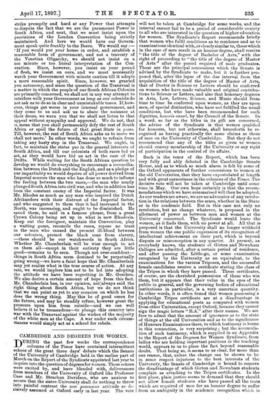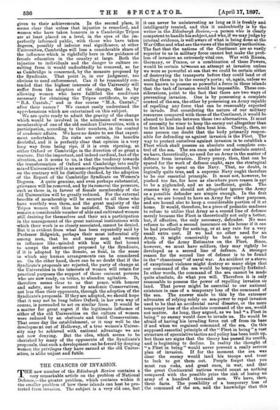CAMBRIDGE AND DEGREES FOR WOMEN.
DURING the past few weeks the correspondence columns of the Times have contained intermittent echoes of the great three days' debate which the Senate of the University of Cambridge held in the earlier part of March on the Report of the Syndicate appointed last year to inquire into the question of degrees for women. These echoes were excited by, and have blended with, deliverances from members of the University of Oxford like Professor Case and Mr. Strachan Davidson, who are anxious to secure that the sister-University shall do nothing to throw into painful contrast the non possumus attitude so de- cisively assumed at Oxford early in last year. The vote will not be taken at Cambridge for some weeks, and the interval cannot fail to be a period of considerable anxiety to all who are interested in the question of higher education- for women. The Syndicate's Report recommends briefly that women who fulfil conditions as to residence and as to examinations identical with, or closely similar to, those which in the case of men result in an honour degree, shall receive " the title of the degree of Bachelor of Arts," with the right of proceeding to "the title of the degree of Master of Arts " after the period required of male graduates. Those are the principal concessions which the Senate is advised by the Syndicate to make, but it is further pro- posed that, after the lapse of the due interval from the acquisition of the title of the degree of Master of Arts, that of Doctor in Science or Letters should be conferred on women who have made valuable and original contribu- tions to Science or Letters, and also that honorary degrees. in Arts, Law, Letters, Science, and Music should from time to time be conferred upon women, as they are upon. men, of special distinction, who have not fulfilled the usual. conditions, but who have been recommended for such dignities, honoris eausd, by the Council of the Senate. In. a word, so far as the titles in its gift are concerned, the advice of the Syndicate is that women qualified for honours, but not otherwise, shall henceforth be re- cognised. as having practically the same claims as those of men on the University of Cambridge. But they do not recommend. that any of the titles so given to women• should convey membership of the University or any right of participation in the control of its affairs.
Such is the tenor of the Report, which has been very fully and ably debated in the Cambridge Senate House, and as to which so much alarm is felt by some of the Oxford opponents of further concessions to women at the old Universities, that they have expostulated at length and with great earnestness in the columns of the Times. The decisive vote will not be taken at Cambridge until some time in May. Our own hope certainly is that the recom- mendations which we have summarised will then be adopted. As our readers are aware, we are no advocates of any revolu- tion in the relations between the sexes, whether in the State or in the academic field. But in this case not only no revolution, but no change whatever, is proposed in the allotment of power as between men and women at the University concerned. The Syndicate would leave the women, as it finds them, with no power at all. All that in proposed is that the University shall no longer withhold from women the one public expression of its recognition of intellectual achievement on their part, which is beyond dispute or misconception in any quarter. At present, as everybody knows, the students of Girton and Newnham Colleges are admitted, after a certain period. of residence, and after passing the Little-go, or some examination recognised by the University as an equivalent, to the examinations for the various Triposes, and the successful female candidates receive a certificate stating the class of the Tripos in which they have passed. These certificates, of course, are the cherished possessions of those who win them, but it appears that their value in the eyes of the public in general, and the governing bodies of educational institutions in particular, is a very uncertain quantity. In other words, it is often found that women possessing a Cambridge Tripos certificate are at a disadvantage in applying for educational posts as compared with women from other Universities, except Oxford, because they cannot sign the magic letters " B.A." after their names. We are free to admit that the amount of ignorance as to the state of things at the old. Universities and as to the significance of Honours Examinations there, to which testimony is borne- in this connection, is very surprising ; but the accumula- tion of such testimony, which is supplied in an Appendix_ to the Report of the Degrees for Women Syndicate, from ladies who are holding important positions in the teaching world, appears to us to place the fact beyond reasonable doubt. That being so, it seems to us clear, for more than one reason, that, unless the change can be shown to be- in some respect injurious to the best interests of the University, the Senate of Cambridge is bound to remove the disadvantage of which Girton and Newnham students complain as attaching to the Tripos certificates. In the first place, plain justice seems to demand that they should not allow female students who have passed all the tests which are required of men for an honour degree to suffer from an ambiguity in the academic recognition which is given to their achievements. In the second place, it seems clear that unless that injustice is remedied, and women who have taken honours in a Cambridge Tripos are at least placed on a level, in the eyes of the im- perfectly informed public, with those who have taken degrees, possibly of inferior real significance, at other Universities, Cambridge will lose a considerable share of the influence which is rightfully hers in the guidance of female education in the country at large. Both the injustice to individuals and the danger to culture re- sulting from it would undoubtedly be removed, so far as Cambridge is concerned, by the measure proposed by the Syndicate. That point is, in our judgment, too obvious to need enforcement. Can it be reasonably con- tended that the highest interests of the University will suffer from the adoption of the change, that is, by allowing women who have fulfilled the conditions necessary for obtaining the Tripos certificate, to sign ." B.A. Cantab.," and in due course " M.A. Cantab.," after their names ? We cannot easily understand the apprehensions which are entertained on this subject.
We are quite ready to admit the gravity of the change which would be involved in the admission of women to membership of one of the old resident Universities, with a participation, according to their numbers, in the control of academic affairs. We have no desire to see that experi- ment undertaken. Its risks are certain, its benefits doubtful, and it is perfectly clear that opinion is a very long way from being ripe, if it is even ripening, at either Oxford or Cambridge in the direction of so great a vent ure. But the important, and indeed cardinal, fact of the situation, as it seems to us, is that the tendency towards the transformation of Oxford and Cambridge into really mixed Universities will in no sense or degree be enhanced, but on the contrary will be distinctly checked, by the adoption of the Report of the Cambridge Syndicate on Women's Degrees. A quite genuine, and even perhaps substantial, grievance will be removed, and by its removal the pressure, such as there is, in favour of female membership of the old Universities will be greatly reduced. For the external benefits of membership will be secured to all those who have worthily won them, and the great majority of the Tripos women will thus be satisfied. That there will remain a considerable number of able and cultivated women still desiring for themselves and their sex a participation in the management of the great national institutions with which their work is so closely associated, cannot be denied. But it is evident from what has been repeatedly said by Professor Sidgwick, perhaps their most influential ally among men, that he and many men and women in influence like - minded with him will feel bound to accept the settlement proposed by the Syndicate, if it is adopted by the Senate, as final, in the sense in which any human arrangements can be considered so. On the other hand, there can be no doubt that if the Syndicate's proposals are rejected, the party of change at the Universities in the interests of women will retain for practical purposes the support of those eminent persons who are now ready, on terms, to abandon agitation. It, therefore seems clear to us that peace, with honour and safety, may be secured by academic Conservatives, not less than their opponents, through the adoption of the Syndicate's proposals. If they are adopted, we should hope that it may not be long before Oxford, in her own way of course, is persuaded to act on similar lines. It would be a matter for great regret if the legitimate influence of either of the old Universities on the culture of women were reduced by an obstinate and timid Conservatism. That some day the establishment, or it may well be the development out of Holloway, of a true women's Univer- sity may be achieved with national advantage we are not now denying. But the idea, which seems to be cherished by many of the opponents of the Syndicate's proposals, that such a development can be forced by denying women the privileges they have earned at the old Univer- sities, is alike unjust and futile.



































 Previous page
Previous page